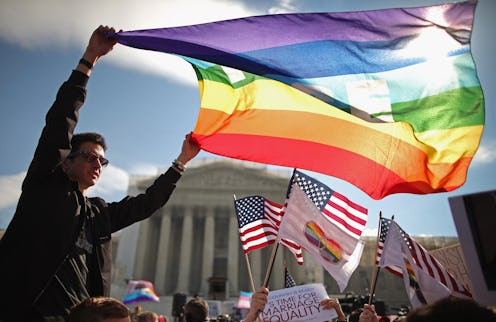News
SCOTUS Hates Gay Conversion Therapy, Too
It's a happy day for the Golden State's LGBT community: The Supreme Court upheld California's gay conversion therapy ban Monday morning. The decision to reject the challenge to the law, mounted by the Christian legal group Liberty Counsel among others, means that California's LGBT youth won't as easily be signed up for programs that try to change their sexual orientation, and that's a very good thing.
Thanks to the decision, a slew of officially-licensed mental health practitioners in California still can't legally practice gay conversion therapy — psychologists, therapists, social workers and doctors, according to Bloomberg, are subject to penalties from their licensing bodies if the ban is violated. It does not, however, apply to non-licensed practitioners, church leaders or "life coaches," for example. It's an obvious loophole that could still yield sad results for members of the LGBT community.
The pitfalls and dangers of trying to alter a person's orientation, especially a young person, are well-known, with findings of depression and suicidal intent arising from such treatments. Beyond the risks involved, it just plain doesn't work — an American Psychological Association investigation in 2009 into the backing for such programs found just 83 studies on the topic over a 47-year period, and of those 83, and a majority of them failed to pass scientific muster. They found that changes to sexual orientation were uncommon, and that same-sex attraction persisted following the completion of gay conversion therapy.
The petitioners had argued that the California ban on such practices, which was upheld by the 9th Circuit Court of Appeals last August, constituted a violation of gay conversion counselors' free speech rights. The effort ultimately went no better at the very highest levels than it did back then, as the Supreme Court disagreed with the free speech argument, thwarting the effort in no uncertain terms. It's big news for the rest of America, too — this precedent could reasonably apply to similar laws in any U.S. state, effectively threatening gay conversion therapy wherever lawmakers have the will to challenge it.
This is an issue which state-level Republicans have grappled with lately, the most overt recent example being in Texas, where the party's official platform now includes an endorsement of gay conversion therapy. This fact was disdained by no less than the state's GOP chairman, Steve Munisteri, who claimed his fellow Republicans inserted it by means of a "parliamentary maneuver," according to the Huffington Post. On the other hand, New Jersey's Republican Governor and potential 2016 Presidential candidate Chris Christie signed a law banning gay conversion therapy in his state.
The California ban would obviously be stronger if it extended to religious groups as well, which for faith reasons might disdain homosexuality and want to change it. That said, "religious freedom" has had a lot of sway with the Supreme Court lately, so it's quite possible a more comprehensive law would have received a different result.
Other states have mulled similar bans lately — New York and Illinois, in particular, had bills to ban gay conversion therapy moving through their legislatures. Both have been halted by GOP opposition. In New York, the opposition also brought down a transgender rights bill, GENDA, in the process.
